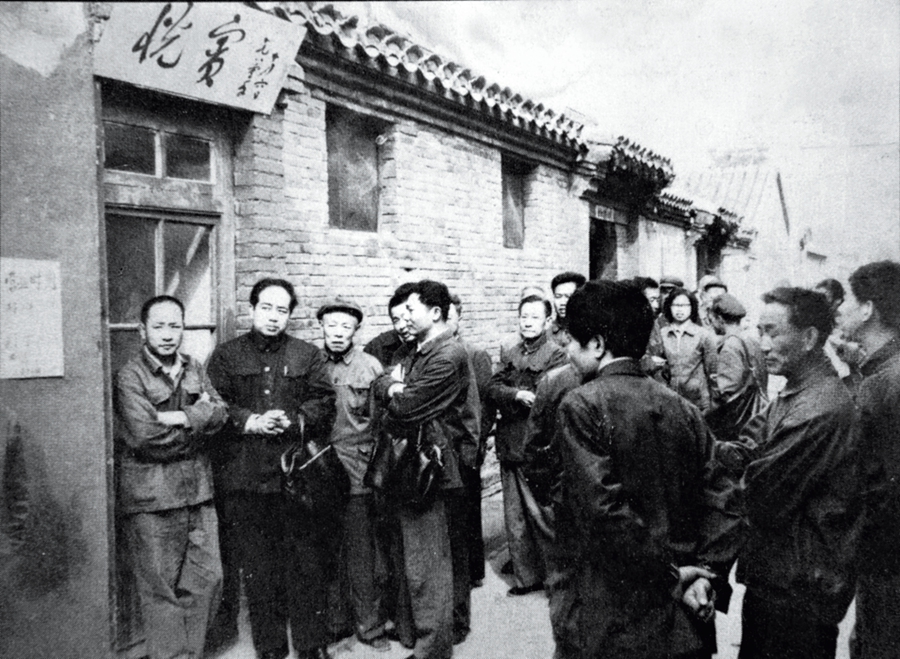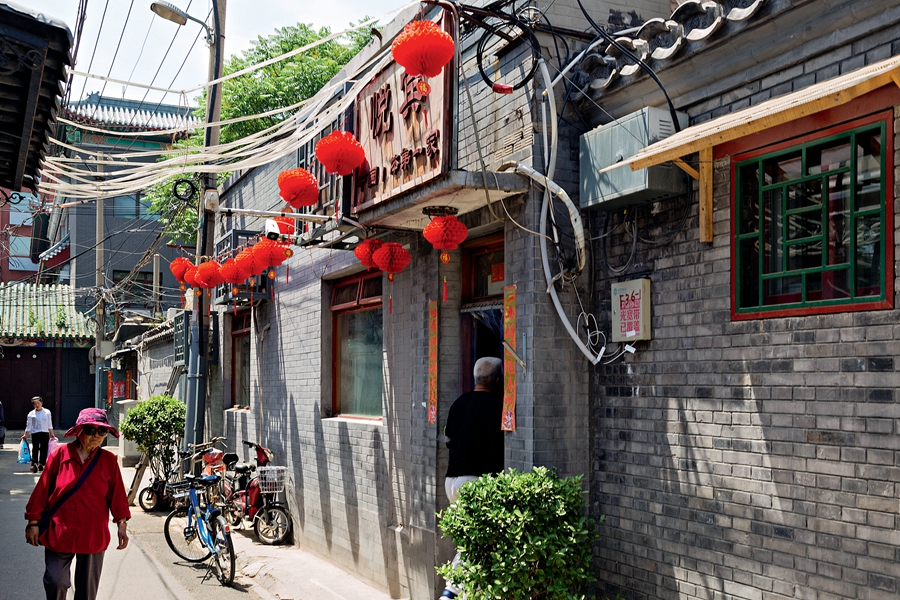THERE’S a Cuihua Hutong close to the Prime Hotel and the National Art Museum of China in Beijing. When noon approaches, an enchanting aroma of food permeates the alley. Following it will lead to a small, unassuming yet aptly named restaurant — Yue Bin (literally means ‘to please guests’).
The restaurant is pretty humble-looking. Its front door can only let one patron in at a time. An old wooden plaque engraved with “the first private restaurant in China” is proudly hung outside. It’s not widely known that this humble eatery was a pioneer that kicked off a wave of privately managed restaurants in Beijing.
Opened ahead of Schedule
Four decades ago, individual and private economy was an abstract term in China. Until April 9, 1979, in a comment on the report of the meetings of the State Administration for Industry and Commerce (SAIC), the State Council, for the first time, made a decision to recover and develop the individual economy, and agreed to issue business licenses to individual repairman and handicraft workers.

The opening of Yue Bin Restaurant in 1980.
In 1980, Liu Guixian and her husband, Guo Peiji, opened Yue Bin Restaurant. They got Beijing’s first business license for private restaurant ownership with the license number 001. The couple became the first with the courage to try something new.
Five ingredients rolls, pork hock with mashed garlic, stir-fried shrimp, fried gluten balls with cabbage – these are the signature dishes on the menu. They are served hot on white porcelain plates. Cooks come and go, and now the family’s third generation runs the restaurant, but the flavor and the ingredients are still Liu’s own creation from 38 years ago.
Nearly four decades ago, Guo Peiji worked as a cook at a state-owned enterprise and earned RMB 30 or more a month (about US $19 then). His wife was a nanny and cooked in the house of a high-ranking government official. They had five children and lived on their monthly salaries. In the early 1980s, it was hard to provide jobs for 14 million youth who had just returned to the city from the countryside.
In 1979, thanks to a proposal by Deng Xiaoping, self-employed businesses began to sprout to alleviate the unemployment pressure. In February that year, the SAIC submitted a proposal to higher-level authorities, suggesting that governments at all levels may, in accordance with the needs of the local market, approve some jobless people with a formal hukou to engage in such individual businesses as repairing and handicrafts, but they were not allowed to hire employees.
It was the first proposal on individual economy approved by the Central Committee of the Communist Party of China and the State Council after the “cultural revolution” (1966-1976).
Guo Peiji still remembered one thing about Zeng Xianzhi, wife of General Ye Jianying. After her trip to England, Zeng said that the Chinese food in England could not hold a candle to Liu’s cooking and suggested that she open a restaurant in Beijing, something the couple had never thought in their wildest dreams. When Zeng mentioned it again, the couple began to work on a written request. After getting approval from their sub-district office, they went on to apply for a business license for opening a private restaurant.
At that time, the only authorized self-employed businesses were for repairers and artisans, but no clear policies on other sectors were available. Unlike other applicants, Liu impressed Jin Yunping, then deputy director of Beijing Administration for Industry and Commerce, with her perseverance and determination: she went here every day, being strong-minded.
“As we wanted to launch a trial at that time, after discussion we agreed to give her a special approval,” Jin said. As there were no printed business licenses, they issued a written one, signed and sealed. In this way, Liu obtained the first business license to manage a private restaurant in Beijing.
They converted three rooms of their one-storey house into the restaurant. The bricks to build the kitchen were procured on loan. Liu bought four used tables and 15 chairs, and made their stove out of an old barrel for roasting sweet potatoes.
The couple decided to open it on October 1, 1980. On the morning of September 30, Guo went to work as usual and Liu bought four ducks to make dishes for neighbors to try first. In the afternoon, upon returning, Guo saw a long line extending to the end of the alley. His neighbors told him: “Why did you go to work today? Many foreigners have come to your restaurant!”
A Weight off the Mind
The opening of China’s first private restaurant was reported by the United Press International (UPI) agency: In the heart of China, private business is revitalized with delicious culinary offerings in a narrow alley.
Liu made RMB 38 on the first day of opening, equivalent to the monthly salary of a worker then. The restaurant had four tables, serving only 14 or 15 customers a day. To eat there, customers had to make a reservation and some even waited more than 60 days for their turn.

In 2018, Yue Bin is still the small restaurant in a small alley.
At that time, Chinese people did not go to restaurants often, as the price of a meal could cost as much as what a wage-earners’ family spent on food for a whole week. Most customers were foreigners and Chinese people from high officials’ families, or journalists. Sometimes in a day there were 20 to 30 journalists. Liu led them to the patio and opened the kitchen window to answer questions while she cooked.
Once the U.S. embassy booked the place, paying RMB 10 per person, far higher than the normal price. Unlike the locals, people from the embassy ate quietly with no comments on food. Liu was quite confused, and it was not until all the dishes were finished did she realize that she had done a good job.
Yue Bin’s popularity also provoked controversy. “There was a lot of criticism saying we wanted to stage a comeback for capitalism, as a result of which, my daughter almost could not get married,” Guo said, back then every day after work, he stopped riding bike and instead walked home when he entered the hutong, in case people knew he was outside and pointed their fingers.
On the morning of the New Year of 1981, Vice Premiers Yao Yilin and Chen Muhua visited the couple. “They told us not to be afraid, which made us totally relieved,” Guo said.
Sticking to Tradition
In October 1981, the Central Committee of the Communist Party of China and the State Council issued decisions on promoting economic development and creating more jobs in urban areas. It clearly recognized and approved self-employed workers. The private economy, banned for many years, emerged again with private restaurants mushrooming across the capital.
Yue Bin was so successful that the Guo’s family saw an annual income of RMB 10,000. They also paid off their bank loan of RMB 500 within only three months. In the beginning, they were not allowed to hire employees, so their children either worked here or helped when free.
In 1992, Liu opened a chain restaurant called Yue Xian several meters away from Yue Bin. Her daughter quit her job and worked there as an accountant.
The two restaurants underwent changes from time to time. Liu was quite strict with her son when it came to paying taxes. “Maybe that is why my dad sent me to learn accounting for our business,” Liu’s granddaughter recalled.
Over the past 38 years, the streets and alleys of Beijing have become filled with all kinds of restaurants with flavors of the world. But Yue Bin is still the small restaurant in a small alley: white wall, small tables, ball pens, carbon paper, and an old abacus.
Time seems to be at a standstill in Yue Bin. Its decoration is still the 1990s style. The main dishes never change and are still served in white porcelain plates. When receiving the payment, the restaurant owner still uses the old abacus instead of advanced counting machines. Payment is only accepted by cash and only recently through mobile phones.
Even the chef has worked here for over 10 years. He Jianjun, the head chef, came here in 2005 from his hometown in northwest China’s Gansu Province. He worked his way up to head chef from a waiter and taught the craft to the younger family members of Guo. “The cooking skills I learned here are not applicable elsewhere. We only use the simplest seasoning such as soy sauce and vinegar to make dishes tasteful.” He also met his wife in the restaurant. Yue Bin has been part of his life.
The eatery is also frequented by neighbors. At noon on April 11, four old ladies over seventy were waiting outside for their turn. “I’ve been eating here since it opened. The family and I are already friends. I like their deep-fried meatballs the most,” one of them said.
Over the decades, society has changed greatly and quickly, which poses many problems to the small restaurant. It is the same old small place, simply decorated, receiving no take-out orders and having no more chain restaurants. Some online comments are pretty skeptical of their old-fashioned management.
However, in fact, the whole family has discussed these problems many times. They’ve rejected external cooperation with careful consideration in case Yue Bin became something totally different from what the founders aimed for it to be.
Guo Hua, Guo’s granddaughter, said that their family had been devoted to the operation of the restaurant for decades, so they need to be prudent. “If we started a new one, we certainly know how to operate it on a large scale, how to serve small portions of delicate dishes to increase profits. But we will not take Yue Bin to try our luck. It’s a legacy of my grandparents.”
Having been managed by three generations of the Guo family, Yue Bin is a witness to the changes and innovations in the past three decades. “My grandparents were wholly devoted to this restaurant, which is the reason why we cherish it so much. For us, the big challenge remains how to manage it well in the new era,” said Guo Hua.
WANG JIAHUI is a journalist with The Beijing News.